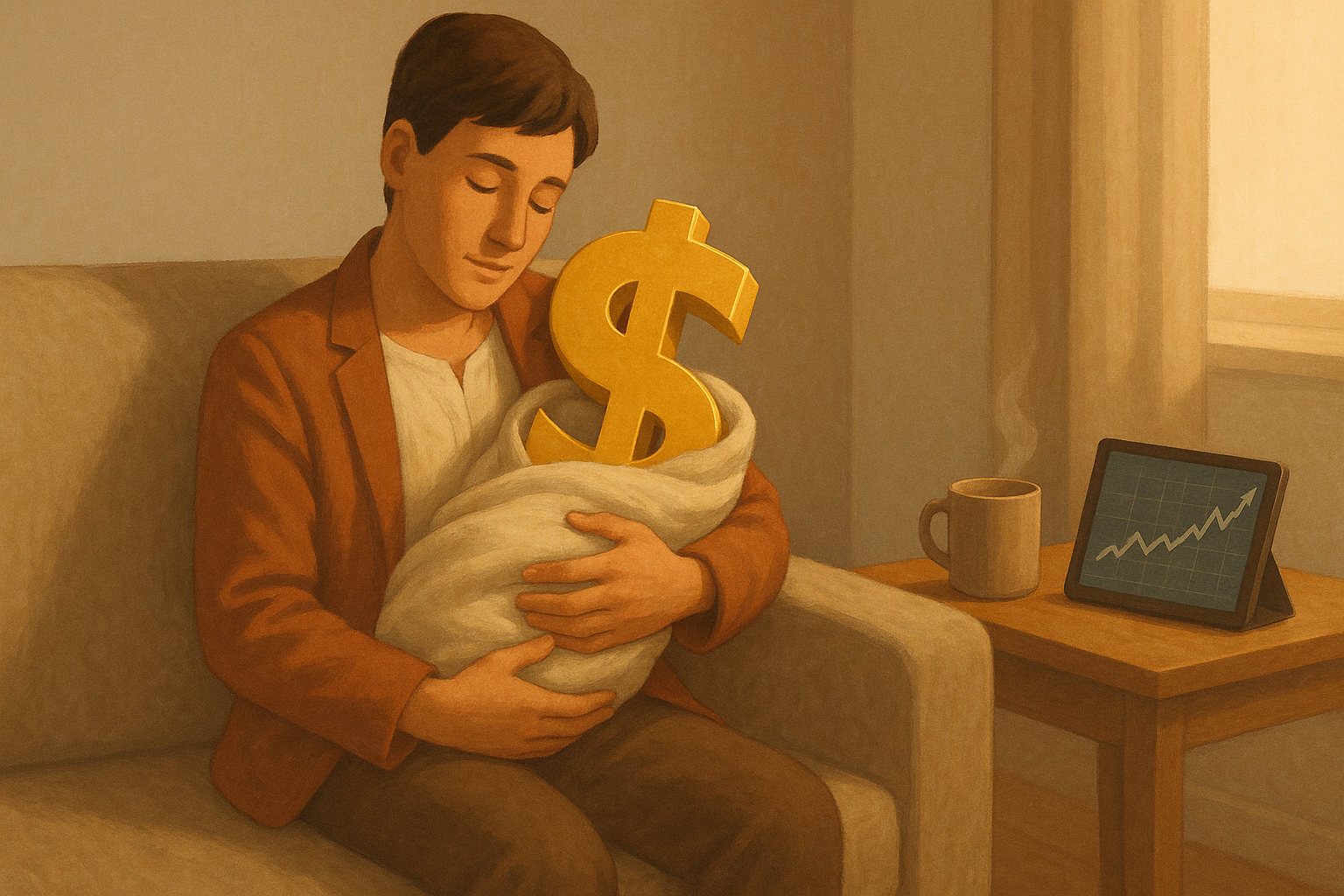Let's be honest—we're all guilty of it. There's that one stock in your portfolio that you just can't bring yourself to sell, even when every rational bone in your body is screaming "DIVERSIFY!"
I call them "baby stocks." You know the type. The company whose quarterly reports you read first. The stock you check before your morning coffee when markets plunge. The holding you'll passionately defend at dinner parties after your third glass of wine.
And you're not alone. Just last week, I spoke with a veteran investor who confessed his 15-year "relationship" with Amazon. "It's research," he insisted, while describing his Prime addiction. "I'm just staying close to my investment." Sure, buddy. And I read Playboy for the articles.
This peculiar attachment isn't just random sentimentality. It sits at the crossroads of what behavioral economists call the endowment effect—our irrational tendency to overvalue things simply because we own them—and something deeper, more personal.
For years, Apple was my baby. I'd bought in when Jobs returned and the company was flirting with bankruptcy (a gamble that, frankly, seemed insane at the time). My justification sounded intellectual enough: ecosystem lock-in, brand premium, design advantage. But the emotional core? Much simpler. Every time I pulled out my sleek iPhone while friends were still fumbling with their BlackBerries, I felt a little jolt of validation. See? I was right.
This consumer-investor feedback loop creates a powerful psychological comfort zone. You're not just some faceless shareholder—you're participating in the company's narrative! You understand the product as a customer! That understanding feels like an edge, doesn't it?
Sometimes, this works brilliantly. Peter Lynch—the legendary Fidelity manager—famously pushed investors to buy what they know. Plenty of early Amazon, Netflix, or Apple investors were simply enthusiastic customers who recognized transformative products before Wall Street's suit-wearing analysts caught on. The user experience provided genuine insight.
But... (and you knew there was a "but" coming)...
This approach has some glaringly obvious pitfalls. First, your personal experience represents a sample size of exactly one—statistically insignificant by any measure. Second, loving a product tells you precisely nothing about whether its stock is reasonably priced. And third, emotional attachment becomes quicksand when fundamentals start deteriorating.
The most dangerous baby stocks are those that become entangled with your identity. Tesla stands as perhaps the ultimate example. Owning Tesla isn't just an investment; for many, it's a declaration about climate change, innovation, and even tolerance for, um, colorful CEO behavior. When a stock becomes part of who you are, selling feels like betrayal.
What fascinates me, having covered investment psychology since 2016, is how this phenomenon crosses political divides. Conservatives might clutch Fox Corp or Chick-fil-A (if it were public) to their portfolios, while progressives might cling to Beyond Meat or Etsy. Different tribes, identical psychology—the merging of consumption habits, personal identity, and financial decisions.
Look, I get the appeal. These emotional attachments make investing feel less abstract, more connected to our daily lives. But it's terrible financial practice.
The very companies most likely to inspire this devotion—consumer-facing brands with cult-like followings—often trade at premium valuations precisely because of these emotional connections. You're literally paying extra for the quality that makes you love the company. Not exactly Warren Buffett's value investing playbook, is it?
So what's the solution? Maintain clearer boundaries between your consumer self and your investor self. The products you enjoy using and the stocks that will maximize your returns? They're distinct categories with occasional—but not guaranteed—overlap.
By all means, let your consumer experiences inform your investment research. Your on-the-ground insights might spot trends before they appear in earnings reports. But remember that your baby stock's true value comes from future cash flows, not how much you love your Prime membership or how that MacBook makes you feel.
I'm not suggesting you can't hold your baby stock. Just keep it in proper proportion. If your Amazon position has ballooned to 20% of your portfolio, it's no longer a baby—it's a teenager who needs some discipline. Consider right-sizing even when it feels like selling a piece of your identity.
After all, the market couldn't care less about your emotional attachments. And neither should your retirement account.
Market moves: BlackRock's spot Bitcoin ETF saw $705 million in outflows last week, suggesting early adopters are taking profits... Walmart announced a 3-for-1 split, joining the 2024 splitting parade... Nvidia briefly touched the $3 trillion market cap milestone before retreating—because gravity, as it turns out, eventually applies even to AI darlings.
